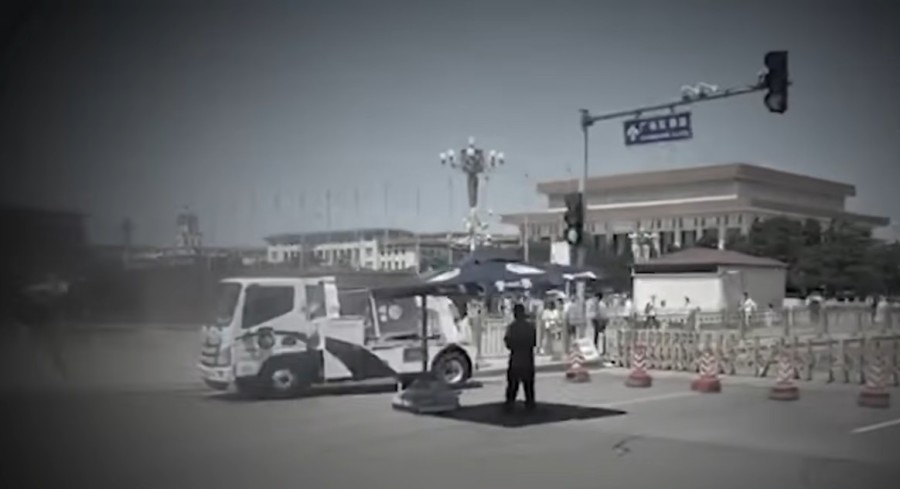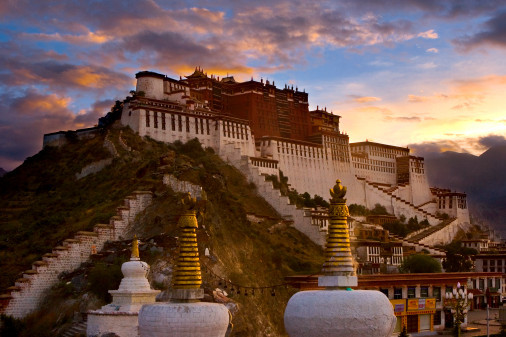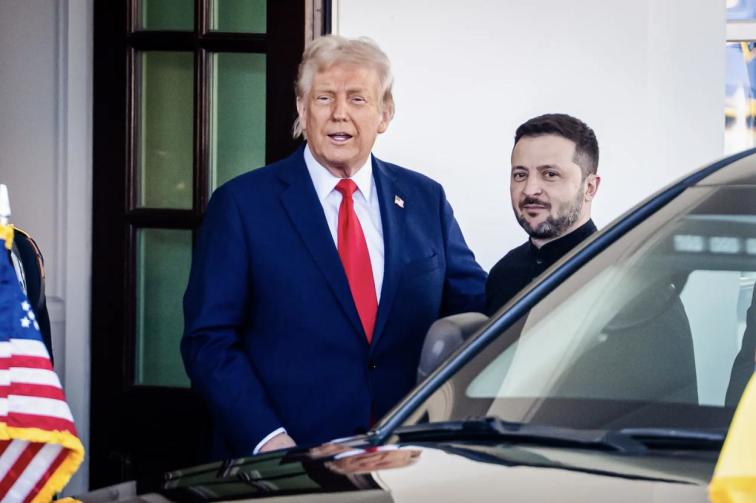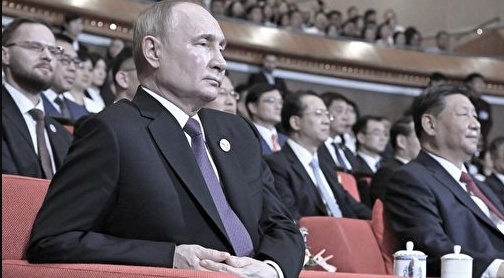The September 3rd military parade in Beijing has not yet arrived, but strict lockdown measures have already been enforced. Guard posts are stationed every few steps, and the entire city of Beijing is shrouded in an atmosphere of fear and tension. (Screenshot)
[People News] The upcoming September 3rd military parade in Beijing, criticized by netizens as a “waste of money and manpower,” remains shrouded in mystery over who the parade commander-in-chief will be. Analysts point out that Zhang Youxia holds the military power, meaning the commander-in-chief should be someone approved by him. Reports also suggest that due to fierce factional struggles, the risk of unexpected incidents is high, and authorities have prepared three contingency plans.
With just days left until the parade, roads around Tiananmen have been repeatedly sealed off, shops forced to close, and large-scale internet shutdowns imposed. Authorities are carrying out verification checks on residents, and even taxi drivers have been forbidden from discussing politics with passengers. Combined with China’s stagnant economy and widespread hardship, public anger is boiling, creating major headaches for the authorities. Many online critics slam the event as a waste of resources: “With the state treasury barely able to cover the military budget for a few more months, this parade is nothing more than whistling in the dark to bolster their own courage. It’s a show of force that wastes the people’s resources, all just to suppress unarmed citizens.”
Commentator Jiang Feng believes the real issue troubling the CCP leadership is whether Xi Jinping himself will appear atop Tiananmen on September 3rd. According to the plan, Xi must deliver a speech that day, including the line: “Comrades, thank you for your hard work!” But rumors suggest some in the military want Zhang Youxia to take over the inspection. Jiang Feng argues that if Zhang takes Xi’s place, it would signal Xi’s loss of control, a forced palace coup, and effectively a power transition. Whether Zhang, at his age, would risk becoming the first mover in such a coup is uncertain—doing so would bring not only political consequences but also ignite future party infighting.
Jiang further stated that many attribute Xi Jinping’s rapid aging and health decline to pressure and overwork, but those who understand the CCP system know the real force that has worn Xi down is Donald Trump. According to Jiang, “Trump” is Xi’s nemesis, the nightmare he cannot shake off.
Jiang revealed that on August 15, 2025, Trump, flying aboard Air Force One en route to Alaska to meet Putin, dropped a bombshell during a Fox News interview: “Xi Jinping told me, ‘As long as you are president, I will never attack Taiwan.’”This remark shocked not only America but also Zhongnanhai. For years, Xi had been loudly preparing for war over Taiwan, only to privately assure Trump otherwise. This shows Xi is not a strongman but a coward—not willing to fight, but afraid to, and above all afraid of Trump.
According to a Dajiyuan report, the commander-in-chief for the September 3rd parade remains undecided due to intense internal CCP struggles. Traditionally, the role is filled by the Central Theater Command commander. The current commander is believed to be Wang Qiang, with Xu Deqing as political commissar. But their absence from the July 31st PLA Day reception sparked speculation that both have run into trouble.
Former PLA Navy Lieutenant Commander Yao Cheng stated on August 24th that Wang Qiang may indeed be in trouble, while Deputy Commander Li Zhizhong has already been investigated. Authorities are unlikely to transfer another theater commander for the role, making Joint Staff Department Chief of Staff Liu Zhenli—the protégé of Vice Chairman Zhang Youxia—the most likely candidate.
Some suggest Defense Minister Dong Jun could also serve as parade commander, given that he holds the same rank as the Central Theater Commander. Though Dong lacks command experience, the role is largely ceremonial, so he could fulfill it. However, Zhang Youxia distrusts Dong, who was aligned with disgraced former Political Work Department head Miao Hua.
Yao Cheng noted that the parade has already undergone three rehearsals, and by now the commander-in-chief should have emerged to oversee proceedings. If the Central Theater Command lacks a commander, it suggests Zhang Youxia himself is orchestrating the arrangements, perhaps deliberately delaying the appointment to embarrass Xi.
On August 18th, Yao revealed that the factional infighting between Xi loyalists and rivals has created too many destabilizing factors. A retired officer inside the Beijing Military Commission compound disclosed that the parade command has devised three contingency plans:
-
Xi Jinping presides over the parade.
-
If Xi suffers health issues, Zhang Youxia will step in.
-
If Xi and Zhang are deadlocked, a compromise candidate—Liu Zhenli, Chief of Staff of the Joint Staff Department—will preside.
Yao warned that the CCP had intended the parade to showcase military power and regime stability to the world. But any disruption during the event could endanger the CCP’s rule, even risk splitting the military.
Independent commentator Du Zheng, writing in Taiwan’s Up Media on August 23rd, argued that Liu Zhenli is the likely commander-in-chief, though if Zhang Youxia personally assumes the role, it would reinforce suspicions that he is consolidating military power.
Du also noted that the delayed appointment suggests a massive personnel crisis in the military. Among the 79 generals promoted since Xi took office, at least 26—over 30%—have either been officially dismissed or are rumored to be under investigation.
Du concluded that September’s parade in Beijing is essentially political theater. The fireworks of the parade cannot conceal the brutal power struggle raging within the CCP’s military ranks.










News magazine bootstrap themes!
I like this themes, fast loading and look profesional
Thank you Carlos!
You're welcome!
Please support me with give positive rating!
Yes Sure!